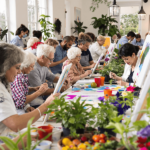Is the glass half empty or half full as we age? This question reflects a choice we all face: to see aging as a period of decline or as a time of fulfillment, growth, and opportunity. Research shows that maintaining an optimistic mindset can significantly improve mental, emotional, and physical well-being, particularly as we grow older.
In this post, we’ll explore the transformative power of optimism in aging and provide practical strategies to cultivate a positive outlook, even in the face of challenges.
The Science of Optimism
Optimism isn’t just about “thinking happy thoughts.” It’s a mindset that influences how we interpret and respond to life’s events. Studies reveal that optimistic individuals are more likely to experience better health outcomes, recover faster from illness, and enjoy longer life spans.
- Improved Physical Health: Optimists tend to engage in healthier behaviors, such as regular exercise and balanced eating, and experience lower levels of stress, which benefits cardiovascular and immune health.
- Enhanced Emotional Well-Being: A positive outlook reduces the risk of depression and anxiety, promoting resilience in the face of life’s inevitable challenges.
- Stronger Relationships: Optimism fosters better communication and connection, enriching social and family bonds.
Communities like Okinawa, Japan—home to some of the world’s happiest and longest-living elders—highlight the role optimism plays in longevity. Their focus on purpose (or ikigai), gratitude, and connection creates a culture of positivity that enhances quality of life.
The Benefits of an Optimistic Mindset in Aging
As we age, optimism helps us navigate changes with resilience and grace. Here’s how a positive outlook can make a difference:
- Reframing Challenges
Instead of focusing on limitations, optimists see opportunities for growth. For example, a health diagnosis might become a catalyst for adopting a healthier lifestyle or prioritizing self-care. - Strengthening Resilience
Optimism equips us to bounce back from setbacks, whether it’s recovering from surgery or adapting to changes in physical abilities. It shifts the focus from “why me?” to “what can I learn?” - Fostering Joy in Everyday Life
An optimistic mindset encourages us to find beauty and meaning in small, daily moments—a sunny morning walk, a heartfelt conversation, or a creative project.
Practical Strategies for Cultivating Optimism
Optimism is a skill that can be developed at any age. Here are some simple yet effective practices to help you build a positive mindset:
- Practice Gratitude
Gratitude is a powerful antidote to negativity. Start or end each day by listing three things you’re thankful for. Whether it’s the warmth of your morning coffee or the support of a loved one, focusing on blessings shifts your perspective. - Reframe Negative Thoughts
When faced with a challenge, consciously shift your thinking. Instead of “I can’t do this anymore,” try “What new ways can I approach this?” Over time, this habit trains your brain to focus on possibilities rather than limitations. - Surround Yourself with Positivity
The people we spend time with influence our outlook. Seek out relationships that uplift and inspire you, and limit time with those who drain your energy. - Set Meaningful Goals
Having something to look forward to keeps you motivated and focused on the future. Whether it’s learning a new skill, volunteering, or planning a trip, pursuing goals fosters a sense of purpose. - Embrace Humor
Laughter is a natural mood booster and stress reliever. Find opportunities to laugh, whether it’s watching a comedy, sharing a joke, or reflecting on life’s funny moments.
Inspiring Examples of Optimism
Real-life stories show us how optimism transforms the aging process:
- Lisa’s Daily Affirmations: At 70, Lisa started a morning ritual of repeating positive affirmations like, “I am grateful for today.” This simple practice helped her focus on the present and approach each day with a sense of possibility.
- George’s Lifelong Learning: George, in his 80s, embraced the mantra “I’m still learning” by taking online courses in creative writing and history. His curiosity and optimism kept his mind sharp and engaged.
- Ruth’s Community Project: Ruth turned her love of knitting into a charity initiative, creating hats and scarves for homeless shelters. Her optimistic outlook inspired others to join her efforts, fostering a sense of community and purpose.
The Ripple Effect of Optimism
Optimism doesn’t just benefit individuals; it influences those around us. A positive attitude is contagious, creating an environment of encouragement and support. By embodying optimism, you inspire friends, family, and community members to approach aging with hope and enthusiasm.
Overcoming Barriers to Optimism
It’s natural to encounter moments of doubt or negativity, especially during challenging times. Here’s how to stay on track:
- Acknowledge Feelings
It’s okay to feel sad, frustrated, or overwhelmed. Recognizing these emotions is the first step toward processing and moving past them. - Seek Support
Talk to trusted friends, family, or a counselor about your feelings. Sometimes, sharing your worries can provide clarity and relief. - Focus on Progress
Celebrate small wins and incremental improvements. Progress, no matter how small, is a sign of growth and effort.
Conclusion
Developing an optimistic mindset is one of the most valuable tools for aging gracefully. It enhances resilience, fosters joy, and transforms how we experience life’s changes. By practicing gratitude, reframing challenges, and staying open to new possibilities, we can approach aging not as a limitation but as a vibrant journey of discovery and growth.
How do you cultivate optimism in your life? Share your strategies in the comments, and join us next time as we explore how lifelong learning and creativity keep the mind sharp and the spirit alive.
Additional Reading:
Personal Journeys: Everyday People Embracing Aging
Why Aging Gracefully is an Empowering Journey
Optimism #AgingGracefully #MentalWellness #PositiveMindset #Resilience #Gratitude #HealthyAging #Longevity #EmotionalHealth #PurposefulLiving











